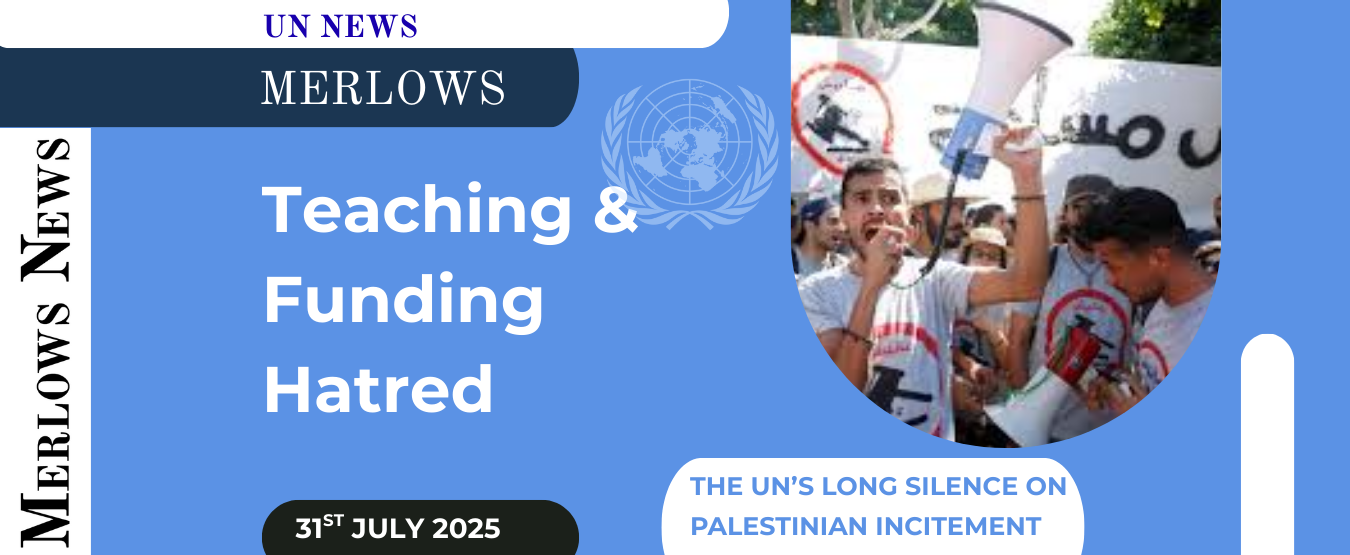The United Nations finally admitted what Israel has said for decades: Palestinian children are taught to hate. But when an institution confesses this late, the admission is less courage than theatre.
In a Nutshell
For years, Palestinian Authority schoolbooks have glorified “martyrs,” celebrated jihad, and erased Israel from maps. Mosques have preached sermons praising suicide bombers. The so-called “martyrs’ fund” has paid salaries to the families of terrorists. None of this is new. It has been documented repeatedly, by independent researchers, by watchdogs, and by Israelis who live with the consequences. Yet for decades, the United Nations has played a strange game: condemning incitement everywhere else while tip-toeing around the Palestinian Authority.
That changed on 30 July 2025, when the UN General Assembly passed a resolution calling for the removal of hate from Palestinian textbooks. It was, on the surface, a breakthrough. The Assembly urged the Palestinian Authority to “end incitement, glorification of terror, and antisemitic content in its education system.” For the first time in years, the words were in black and white.
And yet, what a curious moment it was. For the Guardian, this was a “controversial Israel-backed measure.” For the BBC, it was “deeply divisive.” CNN, with an air of weary symmetry, called it “an unbalanced demand.” One wonders: when did the removal of antisemitism from schoolbooks become controversial? When did the end of child indoctrination become “unbalanced”?
The Reality on the Ground
The truth is that the UN had little choice. Reports from watchdogs had become too overwhelming, and donor governments had begun to whisper their embarrassment. The European Union itself, once a steady funder of Palestinian education, has issued its own rebukes over antisemitic content. At some point, even Turtle Bay could not pretend it did not exist.
The timing, of course, is instructive. While famine in Sudan and massacres in Myanmar receive passing mentions, the only incitement issue to reach the General Assembly floor is the one that can be framed as part of the Israel-Palestinian conflict. Even in its admission, the UN ensures the narrative remains on its favourite stage.
The hypocrisy reveals itself in the archive. In 2018, the Assembly passed resolutions condemning incitement in Myanmar, urging “peaceful and inclusive education.” In 2021, it scolded African militias for the use of child soldiers. No one called those measures “controversial.” No one labelled them “unbalanced.” Only when Palestinian incitement is condemned does the UN bureaucracy and its chorus of media allies grow shy.
UN General Assembly Resolution (30 Jul 2025):
“The Palestinian Authority must remove antisemitic and inciteful content from its textbooks.”
Source: UN Press
History offers lessons in how hatred is taught and sustained. Nazi Germany understood that textbooks are weapons as potent as rifles. Mao’s China rewrote its past to shape the present. Rwanda’s Hutu extremists used schools and radio to prepare a generation for slaughter. It is never “unbalanced” to confront incitement. It is the first duty of civilisation.
The fantasy is that this resolution marks a turning point—that donor nations will condition their funding, that Palestinian children will be allowed an education free of hatred, that the cycle of indoctrination will be broken. The reality, more sobering, is that words on paper rarely change political will. The Palestinian Authority has ignored such calls before, and the UN has lacked the courage to enforce its own demands.
And yet, there is a sliver of rational hope. If even the UN can be shamed into admitting the obvious, perhaps donor nations can be pressed to act. The debate is no longer whether Palestinian incitement exists. The debate is whether the world has the will to stop funding it.
BBC Headline (31 Jul 2025):
“UN adopts controversial Israel-backed resolution on Palestinian textbooks.”
Source: BBC News
The Merlow View
What we are witnessing is not a sudden moral awakening, but a reluctant confession. Institutions often admit only what can no longer be denied. The lesson is not that the UN is brave, but that truth when repeated long enough eventually forces its way into the record.
For Israel, the admission is vindication. For Palestinians, it is an opportunity: the chance, however slim, to reimagine an education not built on resentment. For the world, it is a reminder that funding without oversight is complicity.
If there is to be a solution, it lies not in more declarations, but in the simple act of enforcing them: tying aid to reform, conditioning money on accountability, and refusing to subsidise hatred. History shows that children taught to hate will one day act upon it. The choice is whether to continue funding the next generation of killers, or to insist at last on a curriculum of peace.
The point is not to cheer the UN’s belated courage, but to notice what it reveals. Incitement was denied for decades, then admitted when denial became impossible. That is how institutions work: truth arrives slowly, then all at once. The invitation is to stay awake long enough to recognise it, and to ask why it took so long.







Share this: